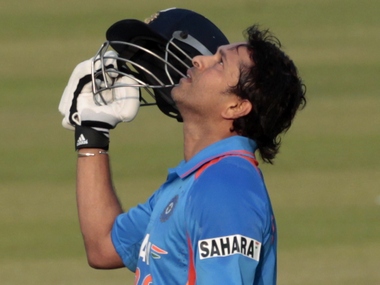It’s not just the billion Indians who are overwhelmed by Sachin Tendulkar’s feat of the hundred hundreds, the international press is overwhelmed as well. “The true greats - the really, really, really great - transcend their sport, become almost god-like, and gods don’t go to the supermarket for their shopping. Tendulkar, a legend in his own career, is on the top table with Tiger, Jordan and Pele,” writes BBC Sport’s Ben Dirs in his blog. [caption id=“attachment_247491” align=“alignleft” width=“380” caption=“Sachin Tendulkar celebrates after he scored his 100th international century during their Asia Cup one- day international. Reuters”]  [/caption] That was just the blog on the BBC. They have another report as well.“At the tender age of 16, Tendulkar began his international career, making his Test debut for India against Pakistan in Karachi, scoring 15. It might have been an inauspicious start, but he showed his backbone by batting on in a blood-soaked shirt after a Waqar Younis delivery smashed into his face early in the innings,” says Mark Higginson for BBC Sports . The Guardian pays tribute to Sachin through a photo feature. The first photograph refers to the same baptism by fire. “The Little Master rose to prominence at an early age. The 16-year-old is pictured here in Lahore, Pakistan during his first senior tour. Tendulkar battled on in a blood-stained shirt to make a half century in Sialkot after being hit under the grille by Waqar Younis,” says the caption. The Sun, in trademark style, says Sachin’s ‘Just Ton it! CNN has a video marking the milestone. Here it is: And Derek Pringle, writing in The Telegraph, tells us just how great an achievement Sachin’s is.“The scale of the feat defies the laws of modern sport and not just because of the physical and mental processes demanded of making any three-figure score. Tendulkar began his Test career against Pakistan in 1989, when 16, and bar brief absences for elbow injuries, has played non-stop ever since. Records are bound to tumble when you inhabit the international stage for 22 years, but retaining the appetite and a child-like enthusiasm, as well as persuading countless captains and selectors to keep picking you, is as impressive as scoring the runs,” says former cricketer Derek Pringle writing in The Telegraph. We’ll see a lot more as the news sinks in – and writers have the time to say what they want to articulate.
It’s not just the billion Indians who are overwhelmed by Sachin Tendulkar’s feat of the hundred hundreds, the international press is overwhelmed as well.
Anant Rangaswami was, until recently, the editor of Campaign India magazine, of which Anant was also the founding editor. Campaign India is now arguably India's most respected publication in the advertising and media space. Anant has over 20 years experience in media and advertising. He began in Madras, for STAR TV, moving on as Regional Manager, South for Sony’s SET and finally as Chief Manager at BCCL’s Times Television and Times FM. He then moved to advertising, rising to the post of Associate Vice President at TBWA India. Anant then made the leap into journalism, taking over as editor of what is now Campaign India's competitive publication, Impact. Anant teaches regularly and is a prolific blogger and author of Watching from the sidelines. see more


)

)
)
)
)
)
)
)
)



